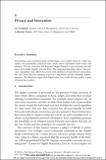| dc.contributor.author | Goldfarb, Avi | |
| dc.contributor.author | Tucker, Catherine Elizabeth | |
| dc.date.accessioned | 2019-07-16T21:56:27Z | |
| dc.date.available | 2019-07-16T21:56:27Z | |
| dc.date.issued | 2011-06 | |
| dc.identifier.issn | 1531-3468 | |
| dc.identifier.issn | 1537-2618 | |
| dc.identifier.uri | https://hdl.handle.net/1721.1/121719 | |
| dc.description.abstract | Information and communication technologies now enable firms to collect detailed and potentially intrusive data about their customers both easily and cheaply. Privacy concerns are thus no longer limited to government surveillance and public figures’ private lives. The empirical literature shows that privacy regulation may affect the extent and direction of data-based innovation. We also show that the impacts of privacy regulation can be extremely heterogeneous. We therefore argue that digitization has made privacy policy a part of innovation policy. | en_US |
| dc.publisher | University of Chicago Press | en_US |
| dc.relation.isversionof | http://dx.doi.org/10.1086/663156 | en_US |
| dc.rights | Article is made available in accordance with the publisher's policy and may be subject to US copyright law. Please refer to the publisher's site for terms of use. | en_US |
| dc.source | University of Chicago Press | en_US |
| dc.title | Privacy and Innovation | en_US |
| dc.type | Article | en_US |
| dc.identifier.citation | Goldfarb, Avi, and Catherine Tucker. “Privacy and Innovation.” Innovation Policy and the Economy, vol. 12, Jan. 2012, pp. 65–90. © 2012 The National Bureau of Economic Research | en_US |
| dc.relation.journal | Innovation Policy and the Economy | en_US |
| dc.eprint.version | Final published version | en_US |
| dc.type.uri | http://purl.org/eprint/type/JournalArticle | en_US |
| eprint.status | http://purl.org/eprint/status/PeerReviewed | en_US |
| dc.date.updated | 2019-03-01T19:51:47Z | |
| dspace.orderedauthors | Goldfarb, Avi; Tucker, Catherine | en_US |
| dspace.embargo.terms | N | en_US |
| dspace.date.submission | 2019-04-04T15:38:21Z | |
| mit.journal.volume | 12 | en_US |
| mit.license | PUBLISHER_POLICY | en_US |

